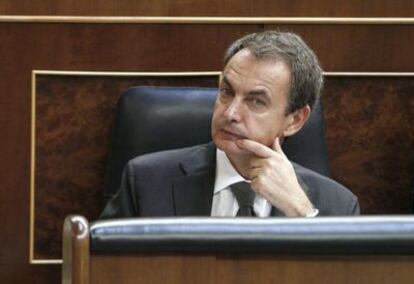Zapatero calls early elections for November 20
Country ready for elections now that the base for economic recovery is in place, prime minister says
Prime Minister José Luis Rodríguez Zapatero on Friday ended months of speculation by announcing early general elections, arguing that with the economic recovery under way, the country is ready for the poll.
The elections are set for November 20, four months before the end of the current government's mandate in March. Zapatero said he would make the official announcement and dissolve parliament on September 26.
Zapatero said the announcement of the election date would dispel doubts and help the country focus on the key economic challenges facing it. "That way the debate won't revolve around early elections."
The prime minister pointed to the improvement in employment in the second quarter as one of the reasons for calling the early poll.
"The path is clear," Zapatero said. "That is why the moment has come to announce the electoral calendar."
He said the incoming government would be responsible for the approval of the 2012 state budget.
But prior to that, the current government plans to approve a decree introducing new measures to ensure the budget deficit target is met and the structural reform program continues, Zapatero added. The minority Socialist government needed the support of minority parties to pass the budget.
The decree, which the Cabinet may approve next Friday, will include amendments to corporate tax, cuts in spending on pharmaceuticals and measures to create employment.
Opposition Popular Party leader Mariano Rajoy welcomed what he described as "good news." Rajoy said the elections would give the country the "necessary drive" to leave behind the economic crisis and help restore confidence in the country.
Other reactions were varied across the political spectrum. Rosa Díez, leader of the Unión, Progreso y Democracia (UPyD) said "it was about time."
In Extremadura, the United Left (IU) coalition said that Zapatero "was trying to save" what little the Socialists have left after their devastating defeat in the May 22 regional and local elections.
The news was also welcomed by the business community which had been clamoring for elections. "The prime minister has taken the right decision," Francisco González, the chairman of Spain's second biggest bank, BBVA, said. "Spain needs a strong government to take decisions that place it once again at the level of the most important countries in Europe."
Europe's debt crisis, combined with the negative outlook for Greece's second bailout package, has hindered the Spanish government's work in improving the economy. Spain, hampered by weak growth and runaway spending in the regions, has also produced instability across the markets.
"The election adds an extra element of near-term uncertainty," Holger Schmieding, chief economist at Joh. Berenberg Gossler & Co. in London, said in a note to investors and quoted by Bloomberg. "But in the longer run, the result could be positive. A fresh government with a fresh mandate could strengthen rather than weaken the reform momentum in Spain."
As for his future, Zapatero said he would not keep his seat in the Chamber of Deputies.

Tu suscripción se está usando en otro dispositivo
¿Quieres añadir otro usuario a tu suscripción?
Si continúas leyendo en este dispositivo, no se podrá leer en el otro.
FlechaTu suscripción se está usando en otro dispositivo y solo puedes acceder a EL PAÍS desde un dispositivo a la vez.
Si quieres compartir tu cuenta, cambia tu suscripción a la modalidad Premium, así podrás añadir otro usuario. Cada uno accederá con su propia cuenta de email, lo que os permitirá personalizar vuestra experiencia en EL PAÍS.
¿Tienes una suscripción de empresa? Accede aquí para contratar más cuentas.
En el caso de no saber quién está usando tu cuenta, te recomendamos cambiar tu contraseña aquí.
Si decides continuar compartiendo tu cuenta, este mensaje se mostrará en tu dispositivo y en el de la otra persona que está usando tu cuenta de forma indefinida, afectando a tu experiencia de lectura. Puedes consultar aquí los términos y condiciones de la suscripción digital.








































